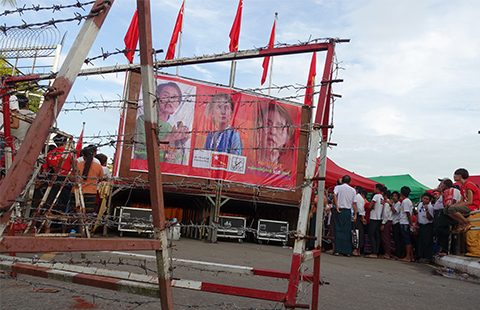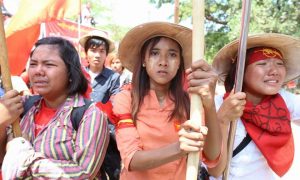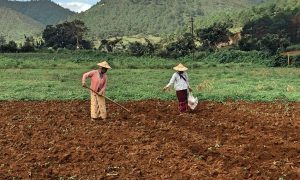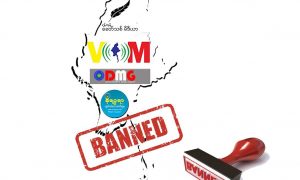When the COVID-19 pandemic began to spread through Southeast Asia, many feared for the health of Myanmar’s fifty-three million citizens. Myanmar has one of the world’s weakest health systems (certainly in terms of indicators like health spending and ventilators per capita it ranks among the lowest in the world). It also has a high burden of the chronic diseases that seem to cause more severe COVID-19. These fears, for the moment, seem to have been unwarranted.
Myanmar appears to have escaped the major outbreaks that are tearing through nearby Pakistan, India, Indonesia and the Philippines, to say nothing of the United States and United Kingdom farther afield. While the rate of testing remains low, Myanmar does not have the high case-positive rate that indicates an unidentified outbreak, nor are hospitals filling up with mysterious respiratory illnesses.
While Myanmar has managed to avoid the worst health effects of the pandemic, COVID-19 continues to threaten the health of Myanmar’s nascent democracy and developing economy. Myanmar is entering what will probably be its deepest recession since the Great Depression of the 1930s. The pandemic has also created a great deal of uncertainty around the upcoming 2020 general election, only the second since Myanmar’s first free and fair elections in 2015, which came after fifty-three years of military or semi-civilian rule.
After months of speculation that the elections would be postponed due to the threat posed by COVID-19, on July first the Union Election Commission (UEC) announced the 2020 general election will be held on November 8, 2020. Even with the low number of cases, the pandemic is likely to have unpredictable effects on the election. An unexpected surge in cases might still trigger a postponement; public health restrictions on gatherings will make conventional election campaigns difficult, causing unexpected results in some seats; and border restrictions are likely to impact the presence of election observers from overseas. Finally, the economic crisis caused by the pandemic may highlight the governing National League for Democracy’s (NLD) unambitious stimulus program and lack of vision for the country’s development.
The announcement of the polling date has not put an end to calls from opposition political parties to postpone the elections. The pandemic-related restrictions have delayed work in political party offices over in recent months, leaving smaller parties months behind in their plans to identify candidates, conduct training, and develop manifestos. As a result, some of these smaller parties have been advocating for a postponement to give them time to catch up on these tasks (and possibly for a material change in the COVID-19 pandemic to arrive: a vaccine or therapy that gives governments confidence in relaxing restrictions).
The UEC is authorized to postpone elections in constituencies where they cannot be held due to “natural disaster or due to the local security situation” (Section 399.e of the Myanmar Constitution). This authority presumably encompasses postponing elections due to a health-related disaster, such as the COVID-19 pandemic. However, just how long the elections could be postponed is unclear.
The UEC has left five seats in Shan state vacant since 2015 (up from four in 2010), due to “security concerns”, a euphemistic acknowledgement that these areas are outside of Nay Pyi Taw government control. Elections were postponed in Pangsang, Panwaing, Mong Maw and Nar Phan, which are controlled by the United Wa State Army, and Mong La, controlled by the National Democratic Alliance Army. Both Ethnic Armed Organizations have close ties to China and remain outside the nationwide ceasefire agreement.
No political party or other actor has presented a legal challenge to the decision to leave these seats vacant. This appears a tacit acceptance that these seats remain entirely outside of the control of the Nay Pyi Taw government and implies the UEC’s 399.e authority allows it to postpone elections indefinitely. However, a nation-wide postponement of elections should be limited by the requirement that a new parliament be ready for the transfer of power at the end of the five-year term of the previous parliament. This requires new legislators to be ready in the capital, by the beginning of February, 2021. Elections could be postponed until January, although this would leave little time for any further disruptions (adjudicating a disputed result, for example).
Long-term postponements due to conflict-related security threats are likely to be a more significant issue. UEC chair Hla Thein has warned elections are likely to be postponed in parts of Rakhine state. The conflict between the Tatmadaw and the Arakan Army has exploded since 2018, spreading to at least ten townships, causing 200 civilian deaths, and displacing some 200,000 more. Representatives of the Nay Pyi Taw government have been abandoning Rakhine state in droves since early last year, with dozens of ward and village tract administrators resigning and fleeing the state.
Most of those who have abandoned their posts have fled out of fear of the Arakan Army, which has been targeting administration officials. Others have resigned fearing Tatmadaw reprisals against Arakan Army supporters. The Arakan Army has set up a shadow government, collecting taxes and policing crime and misconduct. It seems reasonable to expect the postponement of elections in several of the Rakhine electorates. This will only further disenfranchise the population of Rakhine state, and could exacerbate the conflict.
Previous rounds of elections have seen Rakhine State’s citizens express significant support for Arakan-ethnic parties. However, high levels of support for Arakan parties has not translated to significant power for these parties in the governance of their state. The highly centralized, majoritarian nature of Myanmar’s democracy apportions the Nay Pyi Taw government the power to appoint ministers in the states. The Union Solidarity and Development Party (USDP) and NLD governments have in the past overruled Rakhine support for Arakan-ethnic parties by appointing members of their own parties as ministers. This has translated to a widespread scepticism of the electoral path to self-determination, expressed most clearly in the increasing support for the Arakan Army.
Despite Myanmar’s apparent vulnerability to COVID-19, the NLD government did not implement the kind of comprehensive lockdown that has caused enormous financial hardship even in significantly richer countries like India. Apart from restricting travel over Thingyan, the Burmese New Year festival, when people typically travel from cities to rural areas to visit family, the most important restriction has been a limitation on the size of gatherings. Many townships also implemented their own quarantines, as well as restrictions on movement and entry of outsiders. These measures seem to have been effective in reducing the transmission of COVID-19, however the last week has seen an outbreak taking hold in Rakhine state.
There has been no indication that the restrictions on gatherings imposed by the Ministry of Health and Sports will end in the immediate future, leading to a great deal of uncertainty among political parties themselves about how they are expected to conduct campaigns. While restrictions are routinely ignored by businesses and private citizens, political parties will likely not wish to be seen flouting the law. The restriction on gatherings will benefit major parties like the NLD and USDP, which have local offices throughout Myanmar and can better engage in door-to-door canvassing. Smaller parties hoping to rely on traveling campaign events and rallies to court voters will be disadvantaged.
The restriction on gatherings will also lead political parties to emphasise their online presence. As experienced in other countries, social media is a cheaper and more accessible alternative campaign strategy, and a greater role for online campaigning may work in favour of smaller parties and outsider candidates who can achieve an authentic connection with voters through innovative use of social media.
The NLD is the heavyweight in the field of online politics in Myanmar, with over 2.7 million followers on Facebook (not counting ministers’ own followings). Nevertheless, there may be some room for well-resourced, urban-focused minor parties to win new voters. The newly-formed Union Betterment Party (UBP) and the People’s Pioneer Party (PPP) are best positioned to reach their target voters through online campaigning. Both have already released statements that they would focus on online campaigning.
Ethnic and rural voters will be much harder to reach with online campaigning. Despite the explosion in internet usage since 2014 many rural communities, especially speakers of minority languages, barely use the internet, have poor connectivity and may be under temporary internet blackouts, such as the one imposed on northern Rakhine state and parts of Chin state in 2019-2020. Even though this blackout has officially ended, residents of these states report the quality of service available is so low that the internet is still effectively out of reach.
Campaigning restrictions may also lend importance to legacy media (print, radio, television). The activities of senior government ministers, most importantly Daw Aung San Suu Kyi, shape daily news coverage, and a greater reliance on legacy media is likely to advantage the NLD. This has already become a salient issue, with opposition parties recently criticising the NLD’s media strategy as exceeding the limits for pre-election campaigning.
Another major effect of the COVID-19 pandemic is likely to be in reducing the presence of international election observers. In the 2015 elections, the UEC issued accreditations to 470 diplomats from thirty-two international embassies, 465 staff from six international election observation bodies, 183 staff from nine international organizations assisting in electoral processes, and 9406 monitors from Myanmar CSOs with election monitoring programs.
The number of international observers is likely be much lower in 2020, even as UEC is considering boosting the number of polling stations throughout the country, to make physical distancing easier without increasing wait-times. The UEC has also been trialling new models of polling stations, with greater distances between booths, and PPE for both voters and polling station workers. These restrictions may also make it more difficult for election observers, for example if they are not able to present near the voting booths.
In order to prevent the importation of COVID-19 into Myanmar, international flights have been restricted since March, and will remain so at least until the 31st of August. Organisations previously involved in sending election observers remain hopeful they will be allowed entry to Myanmar.
The absence of international election observers may impact the legitimacy of the election result, particularly if the contest is close or if there are allegations of fraud. According to Jonathan Stonestreet, Associate Director of the Democracy Program at the Carter Center, “international election observation is critical. Myanmar’s election process has flaws. It had flaws in 2015, but people accepted the results, in part due to the presence of international and domestic citizen election observers. If the ability to observe is impacted by COVID-19, that is likely to raise questions.” The Carter Center has departed from its normal approach to election monitoring and started training Myanmar citizens as long-term observers, but is still hoping to be able to rely on international observers on election day.
Given the increased need for Myanmar resident observers this year, the UEC’s decision to reject the accreditation of Myanmar’s largest civil society election monitoring body, the People’s Alliance for Credible Elections (PACE), as an official election monitor for the 2020 general elections is difficult to understand. PACE planned to conduct a nationwide election observation by deploying up to 2,900 observers. The application was denied due to PACE’s status as an unregistered association, and because PACE receives funding from foreign donors. This is a departure from the UEC’s own policies in the 2015 general election and the 2017 and 2018 by-elections, in which PACE was allowed to participate. Combined with the lack of international observers, it seems many polling places will go unmonitored in 2020.
Myanmar has been slammed by the economic shock of the world recession, which has hit important sectors such as oil and gas, tourism, and manufacturing. Myanmar has also been buffeted by the job losses experienced by at least one-hundred and fifty thousand of its migrant workers, who have come streaming home from Thailand, Malaysia, China and elsewhere (many more remain overseas). Remittances from these workers formerly made up almost four percent of Myanmar’s GDP. In addition to the disappearance of these funds, communities are now faced with the challenge of providing for returned workers and migrant workers stranded overseas.
Previous economic crises in Myanmar have coincided with periods of political turmoil and a rise in inter-communal violence. The Great Depression, which hit Myanmar particularly hard and bankrupted farmers, provoked a wave of anti-immigrant riots and contributed to the nativist turn that would define Myanmar’s post-independence politics. Considering the inter-communal violence that wracked Myanmar between 2012 and 2014, and the escalation of the armed conflict since 2018, this should be a cause for concern.
While Myanmar and the NLD government deserve commendation for their successful handling of the pandemic so far, the country is deeply mired in the global Coronavirus recession, which seems likely to endure for many months or years. So far, the response from the NLD has been limited in its scope and ambition. An increase in strikes has been met with arrests and repression. In June, the government passed a stimulus and relief package, the COVID-19 Economic Relief Plan (CERP), worth about US$1.5-2 billion, or 2-2.5 percent of GDP. In comparison, Thailand has already issued four rounds of stimulus packages totalling more than sixteen percent of GDP, and Singapore has committed to spending more than twenty percent of GDP. As the recession continues to bite, voters may look to the manifestos of minor political parties for alternatives to the NLD’s vision for Myanmar’s economic future.
Even if cases remain low, 2020 will inevitably be remembered as the COVID election in Myanmar. The disruption to the now-somewhat familiar program for general elections has increased the need for an electoral commission that has the confidence of all stakeholders. Lingering uncertainty over the timing of the election and how restrictions will impact campaign events, as well as the controversy over the NLD’s early campaigning, have already boosted opposition parties’ criticisms of the non-independence of the UEC. The NLD and USDP are better placed to navigate these uncertain waters and may benefit from their organization and mobilization capacity. On the other hand, the increased role of social media may contribute to unexpected outcomes in some electorates. This unpredictability further highlights the need for trusted election observers at polling sites.
The first competitive elections after a transition to democracy are fraught and challenging affairs. Unfortunately, Myanmar must face its second competitive election in the context of a global recession and under the shadow of a ruthless pandemic. The country’s success so far is cause for hope, but parties and institutions must guard the public trust as carefully as the public health.
 Facebook
Facebook  Twitter
Twitter  Soundcloud
Soundcloud  Youtube
Youtube  Rss
Rss 


